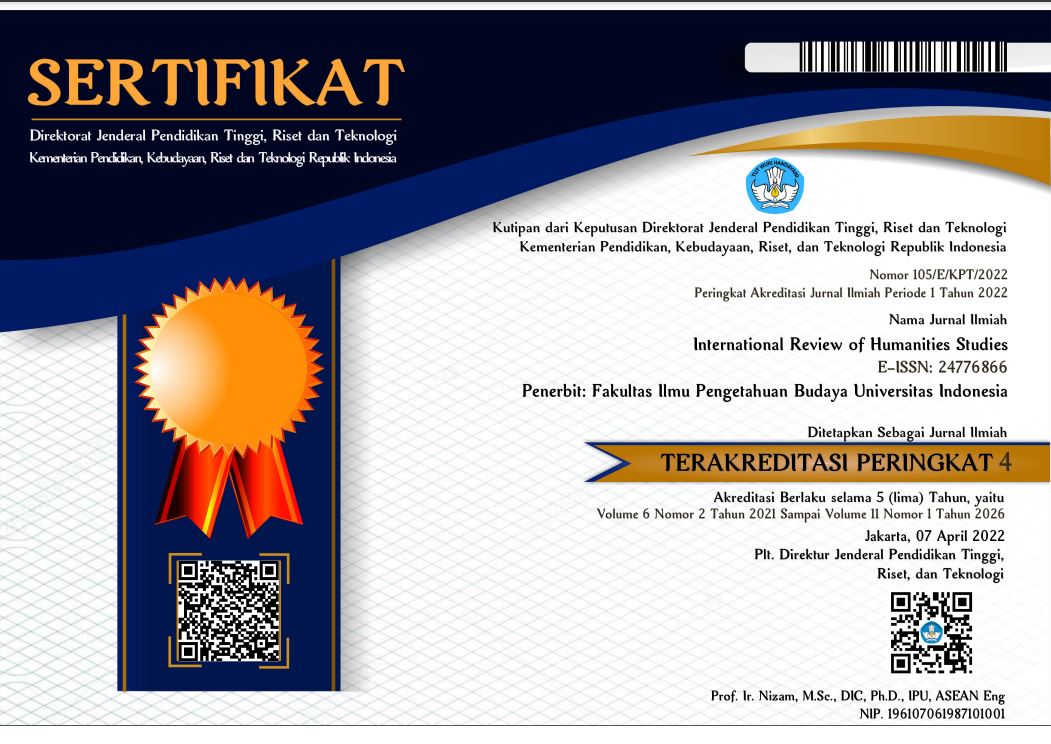International Review of Humanities Studies

Abstract
This paper discusses the essential of Semar Power in the puppet play entitled Bathara Kala Tundhung-Surya Ndadari. The play Bathara Kala Tundhung-Surya Ndadari was taken into consideration in conducting this research because it is a unique play, namely the Ruwat play and the Mahabharata story play which were united through the experience of the presence of Semar characters in a puppet play by Ki Manteb Sudarsono. The main problem in this research is how the essence of Semar Power is formulated in Batara Kala Tundhung-Surya Ndadari. This study aims to formalize Semar's power as the holder of the superiority of power in the play Bathara Kala Tundhung-Surya Ndadari. This research is a qualitative descriptive study with an objective approach that aims to explore and describe the essential of Semar power by the researcher as the main instrument in data collection. The conceptual framework used in this research is a conceptual framework according to Javanese Ethics. The results of this study indicate that the essence of Semar Power is power attached to the status and role above as a pamong of Pandawa, the status as danyang of the land of Java through assistance in carrying out ruwatan, and the role of a god who thwarts the Batara Guru test for Pandawa in Baratayuda. Based on this research, it can be stated that the power of Semar is related to the status and role to eliminate all threats over the power of rage, restore the evil power to its place and maintain the stability of the world and the universe, Memayu hayuning bawana.
References
Poespaningrat, Pranodja. (2005). Nonton Wayang dari Berbagai Pakeliran. Yogyakarta: PT. BP
KR
Soetarno., & Sarwanto. (2010). Wayang Kulit dan Perkembangannya. Surakarta: ISI Press Solo
Creswell., & Jhon W. (2016). Research Design Pendekatan Kualitatif, Kuantitatif, dan Mixed.
Yogyakarta: Pustaka Pelajar
Sukmadinata, N. (2017). Metode Penelitian Pendidikan. Bandung:PT Remaja Rosdakarya
Teeuw, A. (1988). Sastra dan Ilmu Sastra. Jakarta: PT Dunia Pustaka Jaya
Suseno, Frans Magnis. (1987). Etika Dasar: Masalah-masalah Pokok Filsafat Moral. Yogyakarta:
Kanisius
Suseno, Frans Magnis. (1993). Etika Jawa. Jakarta: PT Gramedia
Mulder, Niels. (1983). Kebatinan dan Hidup Sehari-hari Orang Jawa; Kelangsungan dan
Perubahan Kulturil. Jakarta:PT Gramedia
Poerwadarminta., Hardjasoemardja., Poejasoedira. (1939). Bausastra Jawa. Jakarta: Balai Pustaka
Mosada, Karta. (1650). Serat Manikmaya: Een Javaansch Gedicht. Batavia: Bataviaasch
Genootschappen van Kunsten en Wetenschappen
Rusdy, Sri Teddy. (2012). Ruwatan Sukerta& Ki Timbul Hadiprayitno. Jakarta: Yayasan
Kertagama
Yuwono, Dkk. (2004). Laku. Jakarta: Program Studi Jawa FIB-UI
Moeloeng. (2010). Metode Penelitian Kualitatif. Remaja Rosdakarya
Koentjaraningrat. (1984). Kebudayaan Jawa. Jakarta: Balai Pustaka
Junaidi. (1992). “Fungsi Dan Makna Adegan Gara-Gara Dalam Pertunjukan Wayang Kulit Purwa
Gaya Surakarta” dalam Project Report Lembaga Penelitian Institut Seni Indonesia.
As’ari, A.S, & Darmoko. (2018). “Hakikat Kekuasaan dalam Lakon Wahyu Purba Sejati Karya Ki
Seno Nugroho”. Jurnal Kawruh Vol 04, No 01.
Darmoko. (2018). “Sanggit and Soeharto Power Discourse in Purwa Leather Puppets Rama
Tambak Play” in Proceedings of the International Seminar on Recent Language, Literature, and Local Cultural Studies (BASA 2018)
Aryanto, et.al. (2021). “Spiritualitas dan Kekuasaan Dalam Lakon Wayang Arjunawiwaha karya
Ki Nartosabdo: Analisis Wacana Kritis Michel Foucault”. Jurnal Widyaparwa Jurnal Ilmiah Kebahasaan dan Kesastraan Vol 49, No 02.
Randyo. (2009). “Peran Semar dalam Pertunjukan Wayang Kulit Jawa Gaya Surakarta”. Jurnal
Harmonia Vol 9, No 2
Gandul, Cah Gunung. (2017), 20 Mei. Ki Manteb Soedarsono-Batara Kala Tundung/Surya
Ndadari. https://youtu.be/pnQ_lvmzwxw
Recommended Citation
Lestari, Dewi Dian and Darmoko, Darmoko
(2023)
"THE ESSENTIAL OF SEMAR POWER IN THE PLAY OF BATHARA KALA TUNDHUNG-SURYA NDADARI BY KI MANTEB SUDARSONO,"
International Review of Humanities Studies: Vol. 8:
No.
1, Article 19.
DOI: 10.7454/irhs.v8i1.1018
Available at:
https://scholarhub.ui.ac.id/irhs/vol8/iss1/19


